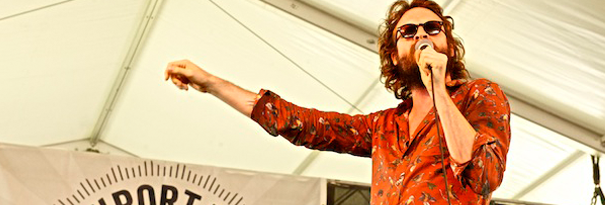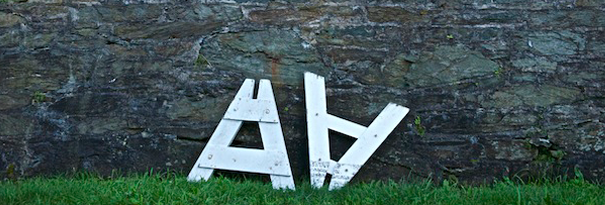
Once Josh Tillman dubbed himself Father John Misty and took to strutting across the stage of Letterman as the “Only Son of the Ladies’ Man,” it was clear the man didn’t want to be separated from the showman. As the Fleet Foxes work history dropped off of bio descriptions and his zip code changed from the PNW to SoCal, tales of “Innocence by Misty” perfume surfaced, mushroom adventures with no destination. On the cruise version of Coachella in 2012, he dubbed his set “Father John Misty reads selections from his favorite works of literature,” and went viral with a descending-staircase karaoke rendition of R. Kelly’s “I Believe I Can Fly.”
Tillman put the cart ahead of the horse so well, actually, that he just about became a parody of himself, letting the caricatures on his debut Fear Fun become more powerful than Josh Tillman. Father John Misty preaching psychedelic messages. Compounding the myth with lyrics that didn’t really achieve honesty. “I’m Writing a Novel” was hilarious and self-loathing and was rooted in the tale of how he found his new creative voice, but at the end of the day it was an effacing proclamation of being a writer when he hadn’t written any fiction yet. And “Only Son of the Ladies’ Man?” The dude builds a chorus around “I’m a leading brand of a one night stand.”
I Love You, Honeybear is different. Fear Fun was acerbic, and again, entertaining, but it did not arrive at truths about Josh Tillman. And maybe that was never his intention at all. And maybe that’s not even his intention on I Love You, Honeybear. But since falling in love and getting married, and framing a narrative arc around that, the eleven songs on here are about as close to the real Josh Tillman we’re ever going to see. And in the process of writing songs about that love, and brilliantly sending up all the social constructs in this shitshow of a society that are up against it, including erotic asphyxiating younger versions of Josh Tillman pleading for President Jesus to save him, it’s impossible to not learn something about yourself in tandem. Meanwhile, “Innocence by Misty” is out of production.
‘I Love You, Honeybear‘
Fun with bodily fluid bedsheet Rorschach metaphors as Tillman opens his triumphant second act as Father John Misty, making sure to set the stage to play homage to the one thing that’s allowed him to rise above this shit-show called society, that he so hilariously and acerbically sends up: Love: [LISTEN]

‘Chateau Lobby 4 (in C for Two Virgins)‘
A wee segue from the sweet pop sendups that dominate elsewhere, Tillman dives completely into love here, cutting himself in bits for comic relief – celibacy, so “bourgeoisie” – but otherwise breaking out the mariachi vibes in full serenade mode to his wife, from virgin to LA matrimony fruition: [LISTEN]

‘True Affection‘
Phone machines, the cause of and solution to all of our intimacy woes. If Tillman would have gone his normal acoustic troubadour verite the way of sonics here, it would be a throw-away, but with the synthetic drum and key cloth, sentiment and sarcasm explode with a refreshing color and strut: [LISTEN]

‘The Night Josh Tillman Came to Our Apartment‘
Because we wouldn’t know how great the ‘honeybear’ is, that is record’s savior, without knowing all the soul-sucking ladies that led to Tillman’s true fit, here we see him show some teeth for a malaprop-spewing contradiction that “hoovers” all his drugs and begs to be choked. Dating is fun, kids: [LISTEN]

‘When You’re Smiling and Astride Me‘
Perfectly placed after the hedonistic third-person apartment visit that ends in contemptuous erotic asphyxiation, the choir girls ascend as our protagonist steps down from his high horse and lulls into the humble truism that he is merely an “aimless fake drifter,” and that’s alright, because love: [LISTEN]

‘Nothing Good Ever Happens at The Goddamn Thirsty Crow‘
Why Tillman wanted to include this Bukowsi fuck-it-all version of himself objectifying women at a Silver Lake bar may seem quizzical, but with its Southern cobblestone strut and dark-side revelations, it only makes him appear that much more human and, thus, deserving of the mighty ‘honeybear’: [LISTEN]

‘Strange Encounter‘
Echoing his “aimless fake drifter” self-reflections earlier Tillman dabbles with a kind of final stretch rising conflict that tears back into another page from his darkest hour dating days, questioning his decency among prayers veiled as ‘swears’, while the guitars get crunchy and the howls noir: [LISTEN]

‘The Ideal Husband‘
Last shake of Tillman’s completely inward skewerings of himself, cymbal and siren cacophony letting loose while every last bit of ‘awful’ the man could show is revealed, paired with a WikiLeaks neurosis of a metaphor in chase of forgiveness, redemption, it doesn’t matter. Up to love now: [LISTEN]

‘Bored in the USA‘
Laugh-track add confounds, but the melody move from guitar to keys compliments the folk torch song send-up of the absurdities of young American citizenship perfectly. As truthful a statement of upper-middle class white existence pervading a gentrifying ‘hood near you that isn’t a Portlandia sketch: [LISTEN]

‘Holy Shit‘
Complimenting as a one-two falling action punch w/ the brilliant “Bored in the USA,” Tillman posits a series of confounding societal contradictions, pitting endless barometers of intelligence and happiness against the forever existential question of what the hell it all means for love and mankind: [LISTEN]

‘I Went to the Store One Day‘
As best a dénouement ‘honeybear’ could have, Tillman, for the first time in the album reducing his sentiments to his simplest of singer-songwriter roots, spinning gold around the mundane act of going to the deli to get smokes, and the poetics of it turning into the most important moment of his life: [LISTEN]











